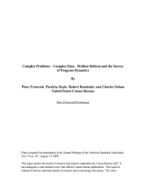Complex Problems - Complex Data: Welfare Reform and the Survey of Program Dynamics
Complex Problems - Complex Data: Welfare Reform and the Survey of Program Dynamics
SPD2002-3
Introduction
The Personal Responsibility and Work Opportunity Reconciliation Act of 1996 (Welfare Reform Act) transformed the role of federal and state governments in caring for low-income families. Among other things, it provided federal funds to states by means of block grants, instituted work and time limit requirements for program recipients, and gave states broad authority to design state welfare programs. It also directed the Census Bureau to continue to collect data from the 1992 and 1993 Survey of Income and Program Participation (SIPP) panels as necessary to evaluate the impact of welfare reform.
Page Last Revised - October 8, 2021




